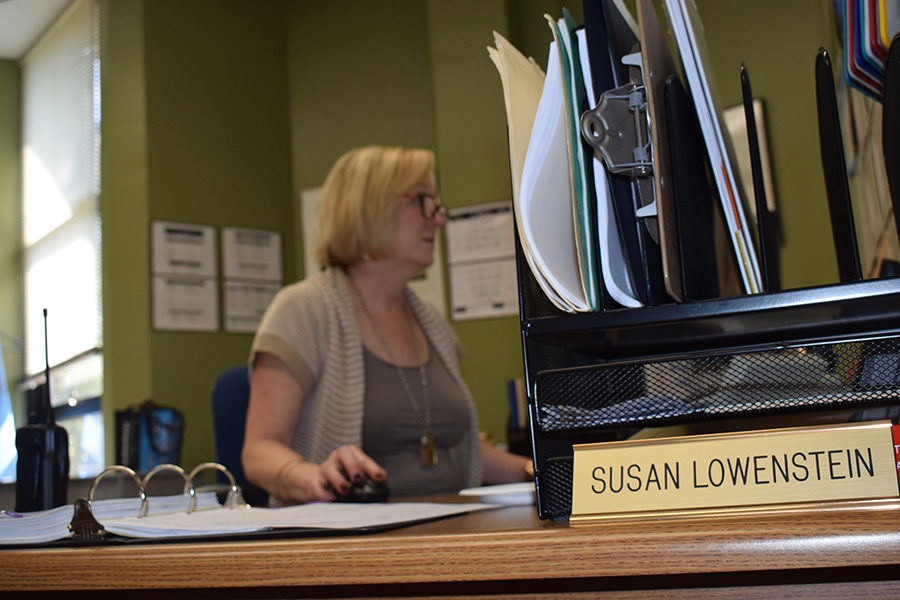Secretaries are a critical part of school communities. However, there is some dispute on the functions of their office, especially after the retirement of front desk receptionist Vickie Hankammer.
The task of the modern secretary has shifted with technology: computers have simplified many duties that they perform.
ÔÇťTechnology has changed the kind of work secretaries do,ÔÇŁ Chief Human Resources Officer Amy Joyce said. ÔÇťTechnology has allowed them to be more efficient and timely with their work and, because of that, more work generally is being given to them.ÔÇŁ
Some employees believe that these extra tasks have caused the workload of secretaries to swell past their 40 hour work weeks. Grade level secretaries have taken on the responsibility of student attendance, (passes, signing in, signing out, detentions), with no pay raise after the departure of the attendance secretary a few years ago.
ÔÇťI think the district was trying to tighten purse strings,ÔÇŁ Lowenstein said. ÔÇťOverall, I think it has been okay for the grade level secretaries to do attendance, but IÔÇÖm sure there are days where they would say it is overwhelming.ÔÇŁ
A similar process occurred due to the retirement of Hankammer last year. Her assignments were delegated to secretaries throughout the building, none of whom received a pay raise.
ÔÇťThey are not going to be replacing that receptionist position,ÔÇŁ Lowenstein said. ÔÇťThere are five women throughout the day who take an hour and a half each to man the desk. There are always a few bumps in the road [when things move around], but it seems to be going well.ÔÇŁ
The process of working overtime hours has also seen some change this year, although sources disagree on what brought this about.
ÔÇťIt really hasnÔÇÖt changed, it is just an enforcement,ÔÇŁ Joyce said. ÔÇťThe way it is supposed to work is if there is an administrator with an occasional need for extra work…they should ask the secretary ÔÇśCan you stay?ÔÇÖ But, there is really no change, it is really just the monitoring and enforcement of: Why is it that our secretaries are working all of this overtime?ÔÇŁ
However, Lowenstein experiences how this policy functions and feels in the day-to-day work of a secretary.
ÔÇťThey changed it this year so [compensation time, which you can redeem for vacation days before the end of the year] is not really an option anymore,ÔÇŁ Lowenstein said. ÔÇťThey are trying to get us to get all of our work done in our day and not work any overtime.ÔÇŁ
There is also a new formula in place in the school district that allows every school to have one secretary per every 400 students. In previous years, the formula was one secretary to every 300 students. This formula is being implemented softly, meaning ÔÇśextraÔÇÖ secretaries are not fired, but once they quit or retire, they will not be replaced.
ÔÇťEach of the high schools saw a reduction,ÔÇŁ Joyce said. ÔÇťIt was to think about how we can re-purpose some of our positions. Some of the [secretary] positions [were changed] into teacher assistant positions to serve the district in a better way. We wanted to make sure everyone was implementing the formula in the same way.ÔÇŁ
New secretaries have flooded into the school this year; four spots opened up last spring due to retirements or changes in job titles of past secretaries. Every class, except for the seniors, has a new secretary, and the senior class secretary Pam McHardy, has only been here one year. 
ÔÇťThereÔÇÖs been a lot of turnover,ÔÇŁ Lowenstein said. ÔÇťSo people who used to be here for years and years, who knew what to do like knowing the back of their hand, [retired].ÔÇŁ
However, Lowenstein believes that the shifting in staff has not been a problem.
“Everyone has fit right in…they seem excited to be here,” Lowenstein said. “They’re getting along with their respective principals and they all seem to really like kids.”
Despite this, tensions among senior secretaries are growing. In Lowenstein’s opinion, secretaries should not always be on the receiving end of district budget cuts.┬á┬á
ÔÇťIt should not always be about the money. [Secretaries] are an important hire because they are the face of an office,ÔÇŁ Lowenstein said. ÔÇťYou have to be comfortable with that person and be able to go to that person, but it is hard when they have extra responsibilities added on. Sometimes it feels like we have to do more with less, and that is frustrating.”



![Gazing up from the stage, junior Joseph McCurdy who played Peter Pan in the school play, Lost Girl, sits next to senior Juliana Rogers, who plays Wendy Darling, during a theater rehearsal. McCurdyÔÇÖs passion for theater began when he observed a West High production in middle school. ÔÇťI've been in the high school theater program since I was a freshman. I've always loved theater, but [what prompted me to join] was [when] I went to see [a performance here] when I was in middle school, and it was super cool,ÔÇŁ McCurdy said.](https://pwestpathfinder.com/wp-content/uploads/2025/11/IMG_6535-1200x798.jpeg)

![Standing tall, stacked in a precise formation, the cheer team strikes a signature pose during halftime on Sept. 12 at the varsity football game. Nearly a month after this performance, the cheer team performed at the Missouri Cheerleading Coaches Association (MCCA) regional competition on Oct. 4, 2025. ÔÇťWe've all come [to] work together a lot more,ÔÇŁ sophomore Elyssa Philippi said. ÔÇťWe're a lot closer than we were [earlier in the season] and going to state has made us closer [in] trying to work with each other, learn [new] skills and make our team better.ÔÇŁ](https://pwestpathfinder.com/wp-content/uploads/2025/11/DSC5139-1.jpg)
![Handing out candy to excited trunk-or-treaters, President of the United Nations ChildrenÔÇÖs Fund club and junior Sara Ashok represents that group. Ashok was eager to participate in this event for multiple reasons. ÔÇťI really wanted to be a part of the event because I get to help create memories for kids and spend time with my friends, spreading the things [I'm passionate about],ÔÇŁ Ashok said.](https://pwestpathfinder.com/wp-content/uploads/2025/11/DSC_8648-1-1200x800.jpg)

![Smiling in a sea of Longhorns, Fox 2 reporter Ty Hawkins joins junior Darren Young during the morning Oct. 3 pep rally. The last time West was featured in this segment was 2011. ÔÇť[I hope people see this and think] if you come to [Parkway] West, you will have the time of your life because there are so many fun activities to do that make it feel like you belong here. I was surprised so many people attended, but it was a lot of fun,ÔÇŁ Young said.](https://pwestpathfinder.com/wp-content/uploads/2025/10/Edited2-1200x798.jpg)
![West High seniors and families listen as a representative of The Scholarship Foundation of St. Louis, Teresa Steinkamp, leads a Free Application for Federal Student Aid (FAFSA) workshop. This session, held in the library, provided guidance on financial aid, scholarships and student loan options. ÔÇťThis event is very beneficial for any seniors who are applying to or considering applying to colleges after high school [because] the cost of college is on the rise for seniors and parents,ÔÇŁ college and career counselor Chris Lorenz said.](https://pwestpathfinder.com/wp-content/uploads/2025/09/DSC_4478-1200x778.jpg)
![Senior Kamori Berry walks across the field during halftime at the Homecoming football game on Sept. 12. During the pep assembly earlier that day, she was pronounced Homecoming Queen. ÔÇťI thought it was nice that the crowd [started] cheering right away. I know [my friends] were really excited for me, and my family was happy because typically non-white people don't win,ÔÇŁ Berry said.](https://pwestpathfinder.com/wp-content/uploads/2025/09/DSC7046-Enhanced-NR-1200x798.jpg)



![Sophomore Shree Sikkal Kumar serves the ball across the court in a match against Lindbergh. Sikkal Kumar has been a varsity member of the varsity girlsÔÇÖ tennis team for two years, helping her earn the number two rank in Class 2 District 2.ÔÇťWhen matches are close, itÔÇÖs easy to get nervous, but I [ground] myself by[staying] confident and ready to play,ÔÇŁ Sikkal Kumar said.](https://pwestpathfinder.com/wp-content/uploads/2025/11/DSC2801-1200x798.jpg)
![Dressed up as the varsity girlsÔÇÖ tennis coach Katelyn Arenos, senior Kate Johnson and junior Mireya David hand out candy at West HighÔÇÖs annual trunk or treat event. This year, the trunk or treat was moved inside as a result of adverse weather. ÔÇťAs a senior, I care less about Halloween now. Teachers will bring their kids and families [to WestÔÇÖs Trunk or Treat], but there were fewer [this year] because they just thought it was canceled [due to the] rain. [With] Halloween, I think you care less the older you get,ÔÇŁ Johnson said.](https://pwestpathfinder.com/wp-content/uploads/2025/10/DSC00892-1-1200x800.jpg)
![Focused on providing exceptional service, sophomore Darsh Mahapatra carefully cleans the door of a customerÔÇÖs car. Mahapatra has always believed his customers deserve nothing less than the best. ÔÇť[If] theyÔÇÖre trusting us with their car and our service, then I am convinced that they deserve our 100 percent effort and beyond,ÔÇŁ Mahapatra said.](https://pwestpathfinder.com/wp-content/uploads/2025/10/DSC_0018-1200x800.jpg)
![Sophomore Aleix Pi de Cabanyes Navarro (left) finishes up a soccer game while junior Ava Muench (right) warms up for cross country practice. The two came to Parkway West High School as exchange students for the 2025-2026 school year. ÔÇťThe goal for the [exchange] program is to provide opportunities for both Parkway students and our international exchange students to learn about other cultures, build connections and become confident, capable, curious and caring ÔÇö ParkwayÔÇÖs Four CÔÇÖs ÔÇö in the process,ÔÇŁ Exchange Program Lead Lauren Farrelly said.](https://pwestpathfinder.com/wp-content/uploads/2025/10/Feature-Photo-1200x800.png)
![Leaning on the podium, superintendent Melissa Schneider speaks to Parkway journalism students during a press conference. Schneider joined Parkway in July after working in the Thompson School District in Colorado. ÔÇťMy plan [to bond with students] is to get things on my calendar as much as possible. For example, being in [classes] is very special to me. I am trying to be opportunistic [meeting] kids [and] being in [the school] buildings. I have all the sports schedules and the fine arts schedules on my calendar, so that when I'm available, I can get to them,ÔÇŁ Schneider said.](https://pwestpathfinder.com/wp-content/uploads/2025/09/IMG_5425-1200x943.jpeg)
![Gazing across the stage, sophomore Alexis Monteleone performs in the school theater. The Monteleone familyÔÇÖs band ÔÇťMonte and the MachineÔÇŁ has been releasing music since 2012, but Alexis started her own solo career in 2024 with the release of her first single, Crying Skies. ÔÇťMy whole family is very musical, [and I especially] love writing [songs with them],ÔÇŁ Monteleone said.](https://pwestpathfinder.com/wp-content/uploads/2025/09/DSC7463-1200x798.jpg)
![Leaping through the air, senior Tyler Watts celebrates his first goal of the season, which put the Longhorns up 1-0 against the Lafayette Lancers. Watts decided to play soccer for West for his last year of high school and secured a spot on the varsity roster. ÔÇť[Playing soccer for West] is something I had always dreamed of, but hadnÔÇÖt really had a good opportunity to do until now. ItÔÇÖs [really] fun being out [on the field], and IÔÇÖm glad I decided to join the team. ItÔÇÖs just all about having fun with the boys and enjoying what time we have left together,ÔÇŁ Watts said.](https://pwestpathfinder.com/wp-content/uploads/2025/09/DSC_1951-1200x855.jpg)

![Shifting global trade, President Donald TrumpÔÇÖs tariffs are raising concerns about economic stability for the U.S. and other countries alike. ÔÇť[The tariffs are] going to pose a distinct challenge to the U.S. economy and a challenge to the global economy on the whole because it's going to greatly upset who trades with who and where resources and products are going to come from,ÔÇŁ social studies teacher Melvin Trotier said.](https://pwestpathfinder.com/wp-content/uploads/2025/05/MDB_3456-1200x800.jpg)
